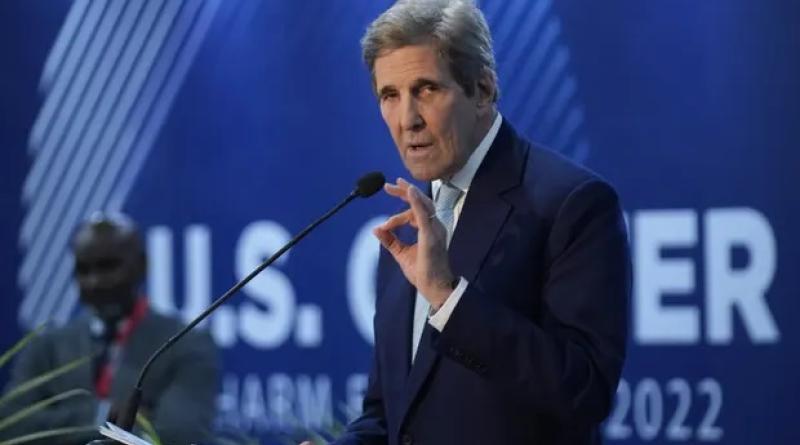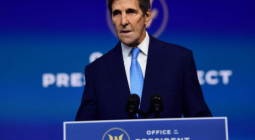Cop27: US ‘totally supportive’ of moves to address loss and damage, says Kerry – as it happened

US climate envoy John Kerry has said his country is ready to discuss the loss and damage at Cop27
US "100% ready" to discuss loss an damage - Kerry
John Kerry said the US was “totally supportive” of moves to address loss and damage, one of the most contentious issues at these talks, and “100% ready” to discuss the issue in detail.
“We have engaged with our friends to work through the proposals,” he told a press conference at Cop27 on Saturday. “We want to engage.”
He said that Joe Biden, who visited the talks briefly on Friday, was also supportive. “We are 100% ready, [the president] has said, to discuss the issue of loss and damage. That’s why it’s on the agenda. We want to come to closure.”
Loss and damage refers to the impacts of extreme weather so severe that countries cannot adapt to them, and the negotiations revolve around how to provide financial assistance for developing countries afflicted by extreme weather, which can destroy their infrastructure and tear apart their social fabric.
Discussions of loss and damage as “compensation” to developing countries from the rich, or “liability” on the part of developed countries, as some activists have sought to frame the issue, are specifically excluded from the negotiations, and have been since the 2015 Paris agreement.
Asked by the Guardian when the US would start paying into a finance facility for loss and damage, and whether China should also pay into such a facility, Kerry said: “It’s not fully defined, what is a facility. There are all kinds of different views on what it could be. No one can sign up to something on it, not yet … We are not at the [financial] facility discussions yet.”
He added: “But we want to engage on something very real.” On the issue of whether China, whose emissions are far larger than any other developing country, should pay for loss and damage in the poorest nations, he did not name China but referred to such countries indirectly. “There are a whole bunch of countries that have also contributed to where we are, so how do we manage that?”
He went on: “What we want to make sure is that we come up with something that satisfies people who are serious, and that we will come out with an agreement [in which] we are confident what the financial arrangements should be.”
He pledged: “We will find a way to have financial arrangements that reflect the reality of how we are all going to deal with the climate crisis. That’s what this is all about.”
Kerry also sought to reassure those concerned that countries were backsliding this year from commitments made at Cop26 in Glasgow to limit global heating to 1.5C above pre-industrial levels. “[Sameh] Shoukry [the Egyptian foreign minister who is president of the talks] does not intend to be the country that hosts a retreat from what was achieved in Glasgow,” he said. “Most countries here have no intention of going backwards.”
But he said countries that had not set out plans to cut greenhouse gas emissions by 2030 in line with the 1.5C temperature limit agreed in Glasgow. He did not name the countries he meant.
On the question of US relations with China, he said there had been informal discussions between the countries at Cop27, but no formal meetings. Joe Biden is expected to meet the Chinese president, Xi Jinping, next week when the G20 meet in Bali from Tuesday. Kerry added: “[We are] waiting to see how things go at the G20.”
ALSO
We are about to close the live blog. Thank you for following developments here in Sharm el-Sheikh during the first week of Cop27.
These are the highlights from today:
-
Russian oligarchs and executives from multiple companies under international sanctions are among the lobbyists attending Cop27 in Sharm el-Sheikh.
-
US climate envoy, John Kerry, said his country was “totally supportive” of moves to address loss and damage, one of the most contentious issues at these talks, and “100% ready” to discuss the issue in detail.
-
Mexico has announced an improved greenhouse gas emissions target, though it is still far short of what is needed, according to activists.
-
A demonstration by a few hundred protesters was permitted inside the Cop27 venue in Egypt although they have not been allowed to march en masse in the streets.
-
The four Indigenous and youth activists from the US who briefly interrupted Joe Biden’s speech yesterday with a war cry and banner have had their Cop accreditation revoked.
Kiribati president: we need money to physically raise our islands
There are few countries more in the crosshairs of the climate crisis than Kiribati – a small, low-lying island nation in the Pacific Ocean that has struggled to get the help it needs from wealthy countries to avoid being submerged by the seas.
Its president, Taneti Maamau, has an audacious plan to physically raise the islands to protect them but this will take billions of dollars and rich countries have been slow to respond with climate finance, he said.
“They have to honour their commitments and pledges,” he said of developed countries. “They need to open their ears more clearly, and their minds. They know what the issues are but I don’t know what is holding them up.”
Maamau said he listened to Joe Biden vowing to act on the climate crisis at Cop27 but said: “I don’t know if the same voice will hang on for the next four or five years. It’s midterm elections in the US.”
“They should act, because time is short for us,” he added. “Some prefer to negotiate but we say no, it’s time for action. We demand action now. For too long we have waited and waited. It’s not fair.”
As food day continues, you’ll be hard pushed to attend an event without hearing buzz phrases such as “equitable transition”, “soil health” and “regenerative farming”. But in reality, two conflicting visions for food systems are unfolding at Cop27 on agriculture day.
In the negotiating rooms, the agenda is mostly focussed on making industrialised agriculture bigger and better, which means more public-private support for fossil fuel fertilisers and tech solutions for climate resilience. This is also the narrative at the Food Systems Pavilion, where green fertiliser, carbon mapping and carbon markets, and methane reducing additives were among the innovations discussed during today’s climate resilient panels.
In a Dragon’s Den inspired event, judges heard pitches from climate tech entrepreneurs whose ideas included a digital app connecting subsistence farmers with suppliers, a roadmap for “sustainable fertliser” in Africa as an emergency response to food insecurity, and satellite mapping to guide pastoralists.
Earlier in a decarbonisation panel, Rob Cameron, the global head of public affairs at Nestlé, the world largest food and drinks company, said the firm had developed its own regenerative agriculture model. “We’re on it because we need to move fast. It’s good that others are moving slowly and consulting with Indigenous people and small farmers … eventually we will converge,” said Cameron. Nestle, which has pledged to achieve net zero emissions by 2050, last year generated almost as many greenhouse gases as Nigeria.
Betty Chinyamunyamu, the CEO of the national smallholder farmers association in Malawi, told Cameron that farmers were part of the solution, and should not just be considered as recipients. “We need more collaboration and mutual benefits. Everyone must be a winner, there should not be winners and losers.”
After running through three buildings, getting lost and tripping up, the Guardian made it to the Food4Climate pavilion where the vision is about transformation, sustainable, healthy food systems and agroecological farming as an alternative to the current industrial system. A two-hour panel discussion on subsidies is a hard sell at this stage of the week, but it’s what’s propping up the fragile global food system that is failing on the environment, food security, human health and animal welfare, according to the panellists.
Here are a couple of jaw dropping stats: about a third of global greenhouse gas emissions come from the food system – 71% of those are down to agriculture and land use change (deforestation, fertilisers, methane emissions). Subsidies play a major role in deciding what and how food is produced, yet at least 90% of the $540bn in global food subsidies have been deemed harmful to the planet, according to UN research.
Much of the world’s population is either undernourished or overweight, signalling that we’re not producing or eating well. “Subsidies are a major change agent. They make it hard for farmers to make changes, and stop consumer driven market changes from naturally taking place. This is not a level playing field,” said Stephanie Haszczyn from the Farm Animal Investment Risk & Return (FAIRR) initiative.
Subsidies are not on the Cop agenda, but they should be, said Patty Fong from the Global Alliance for the Future of Food. “Farmers are locked into an industrialised system and can’t get out of it. We are eroding sophisticated traditional knowledge about Indigenous varieties and weakening community resilience. Neither farmers nor consumers are benefiting.”
One more shocking food fact to finish with: despite the climate crisis already battering food supplies, only 3% of public climate finance has so far gone to food, and today’s announcements suggest that much of the new money coming out of Cop27 will be from the private sector.
MORE READS https://www.theguardian.com/environment/live/2022/nov/12/cop27-latest-news-protests-sharm-el-sheikh-egpyt-climate
COVER PHOTO: U.S. Special Presidential Envoy for Climate John Kerry speaks at the COP27. Photograph: Peter de Jong/AP 




